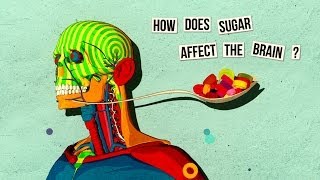(单词翻译:单击)
Picture warm, gooey cookies, crunchy candies, velvety cakes, waffle cones piled high with ice cream.
想象一下温热、绵软的曲奇饼干,酥脆的糖果,天鹅绒般柔软的蛋糕,还有堆着高高冰淇淋的华夫蛋筒。
Is your mouth watering? Are you craving dessert? Why?
你已经流口水了么?你想要吃甜点了么?为什么?
What happens in the brain that makes sugary foods so hard to resist?
你的大脑中到底发生了什么才使得含糖类食物变得如此不可抗拒?
Sugar is a general term used to describe a class of molecules called carbohydrates,
糖是一个用来描述一类被称为碳水化合物的分子的统称术语,
and it's found in a wide variety of food and drink.
在很多食品与饮料中都可以找到它。
Just check the labels on sweet products you buy.
看一下你买的甜食上的标签。
Glucose, fructose, sucrose, maltose, lactose, dextrose, and starch are all forms of sugar.
葡萄糖、果糖、蔗糖、麦芽糖、乳糖、右旋糖,还有淀粉,都是糖的各类形式。
So are high-fructose corn syrup, fruit juice, raw sugar, and honey.
果糖含量很高的玉米糖浆、果汁、粗糖,还有蜂蜜也是一样的。
And sugar isn't just in candies and desserts,
而且,糖不仅存在于糖果和甜点中,
it's also added to tomato sauce, yogurt, dried fruit, flavored waters, or granola bars.
它也被添加于番茄酱、酸奶、果脯、加味水亦或是燕麦棒中。
Since sugar is everywhere, it's important to understand how it affects the brain.
正因为糖无处不在,所以要明白它如何影响大脑才显得很重要。
What happens when sugar hits your tongue?
当糖分接触到你的舌头时会发生什么?
And does eating a little bit of sugar make you crave more?
只吃一点点糖会使你渴求更多么?
You take a bite of cereal. The sugars it contains activate the sweet-taste receptors, part of the taste buds on the tongue.
你咬了一口麦片。它所含的糖分会触发甜味受体,也就是舌头上味蕾的一部分。
These receptors send a signal up to the brain stem,
这些受体会向脑干发送信号,
and from there, it forks off into many areas of the forebrain, one of which is the cerebral cortex.
从那里,它会分支进入前脑的许多部位,其中一个就是大脑皮层。
Different sections of the cerebral cortex process different tastes: bitter, salty, umami, and, in our case, sweet.
大脑皮层的不同部分会处理不同的味觉:苦、咸、鲜以及我们现在所谈的甜。
From here, the signal activates the brain's reward system.
从这里(大脑皮层),信号会激活大脑的犒赏系统。
This reward system is a series of electrical and chemical pathways across several different regions of the brain.
犒赏系统是一系列穿过大脑不同部位的电化学途径。
It's a complicated network, but it helps answer a single, subconscious question: should I do that again?
它是个复杂的网路,但是它会帮助解答一个单一的、潜意识中进行的问题:“我应该再来一次吗,
That warm, fuzzy feeling you get when you taste Grandma's chocolate cake?
享受当你品尝祖母做的巧克力蛋糕时那种温暖、却有些模糊了的感觉?”
That's your reward system saying, 'Mmm, yes!'
然后你的犒赏系统就会说:'嗯,当然了!'
And it's not just activated by food.
然而,它不仅会被食物激活。
Socializing, sexual behavior, and drugs are just a few examples of things and experiences that also activate the reward system.
社交、性行为还有毒品,都只是可激活犒赏系统的事物的几个例子而已。
But overactivating this reward system kickstarts a series of unfortunate events:
但是过渡激活犒赏系统会启动一系列不幸的事:
loss of control, craving, and increased tolerance to sugar.
失控、渴求,还有对糖分忍耐度的增长。
Let's get back to our bite of cereal.
让我们回到吃麦片的例子上去。
It travels down into your stomach and eventually into your gut.
它会来到你的胃里并最终到达肠道。
And guess what? There are sugar receptors here, too.
然后你猜怎么着?那里也存在着糖分受体。
They are not taste buds, but they do send signals telling your brain that you're full
它们不是味蕾,但它们也会发送信号来向你的大脑表明你已经吃饱了,
or that your body should produce more insulin to deal with the extra sugar you're eating.
或者你的身体需要生产更多的胰岛素来帮助消化你额外摄入的糖分。

The major currency of our reward system is dopamine, an important chemical or neurotransmitter.
犒赏系统的“主要流通货币”是多巴胺,一种重要的化学物质或者说是神经递质。
There are many dopamine receptors in the forebrain, but they're not evenly distributed.
前脑中存在着许多多巴胺受体,但是它们的分布并不均匀。
Certain areas contain dense clusters of receptors,
某些部位的受体密集成群,
and these dopamine hot spots are a part of our reward system.
并且,这些多巴胺热点就是我们犒赏系统的一部分。
Drugs like alcohol, nicotine, or heroin send dopamine into overdrive,
像酒精、尼古丁或者是海洛因一类的麻醉药品会使得多巴胺超过限度,
leading some people to constantly seek that high, in other words, to be addicted.
以至于令有些人不停地寻求那种快感,换一句话说,就是上瘾了。
Sugar also causes dopamine to be released, though not as violently as drugs.
糖分也会促进多巴胺分泌,尽管不像毒品那样极端。
And sugar is rare among dopamine-inducing foods.
而且,糖分在诱发多巴胺的食物中也非常少见。
Broccoli, for example, has no effect, which probably explains why it's so hard to get kids to eat their veggies.
比如说,西兰花就对此没有什么影响。也许这就能解释为什么让孩子们多吃蔬菜是如此的难。
Speaking of healthy foods, let's say you're hungry and decide to eat a balanced meal.
谈到健康食品,比方说你感觉很饿,决定要享用营养均衡的一餐。
You do, and dopamine levels spike in the reward system hot spots.
用过餐后,犒赏系统热点中的多巴胺含量就会激增。
But if you eat that same dish many days in a row, dopamine levels will spike less and less, eventually leveling out.
但如果你连续很多天都吃这同一餐,多巴胺的增量就会越来越少,最终达到稳定。
That's because when it comes to food, the brain evolved to pay special attention to new or different tastes.
这是因为在食物问题上,大脑演变得对那些崭新的亦或是不同的味觉异常敏感。
Why? Two reasons: first, to detect food that's gone bad.
这是为什么呢?有两个原因:第一,为了检查出已经变质的食物。
And second, because the more variety we have in our diet, the more likely we are to get all the nutrients we need.
第二,我们的饮食越多样,我们就越有可能得到所有我们需要的营养。
To keep that variety up, we need to be able to recognize a new food,
为了保持那种饮食多样性,我们需要能够识别新的食物,
and more importantly, we need to want to keep eating new foods.
更重要的是,我们需要维持想吃新食物的欲望。
And that's why the dopamine levels off when a food becomes boring. Now, back to that meal.
这就是为什么当食物一成不变的时候,多巴胺的分泌就会逐渐趋于平稳。现在,让我们回到那一餐的问题上。
What happens if in place of the healthy, balanced dish, you eat sugar-rich food instead?
如果用富含糖分的食物取代健康、平衡的饮食,会发生什么呢?
If you rarely eat sugar or don't eat much at a time, the effect is similar to that of the balanced meal.
如果你不怎么摄入糖分或者不一次摄入太多,它带来的影响就和平衡的饮食没有什么两样。
But if you eat too much, the dopamine response does not level out.
但是如果你吃的太多,多巴胺的分泌就会不稳定。
In other words, eating lots of sugar will continue to feel rewarding.
换句话说,摄取大量糖分会持续使犒赏系统兴奋。
In this way, sugar behaves a little bit like a drug.
从这个角度来讲,糖类就有一点像毒品了。
It's one reason people seem to be hooked on sugary foods.
这就是人们之所以对含糖食品着迷的一个原因。
So, think back to all those different kinds of sugar.
这样,想想之前那些所有不同种类的糖。
Each one is unique, but every time any sugar is consumed,
每一种都是独特的,但是每一次摄取这些糖分的时候,
it kickstarts a domino effect in the brain that sparks a rewarding feeling.
它就会在大脑中引发多米诺骨牌一般的效应,并激活犒赏系统。
Too much, too often, and things can go into overdrive.
太多,太频繁,就可能会过度。
So, yes, overconsumption of sugar can have addictive effects on the brain,
因此,没错,糖分的过度摄取可以使大脑上瘾,
but a wedge of cake once in a while won't hurt you.
不过,偶尔品尝一块蛋糕并不会有什么坏处。


